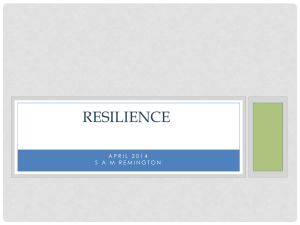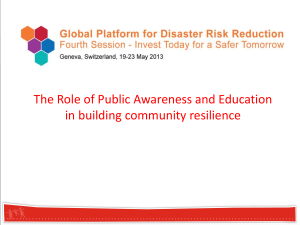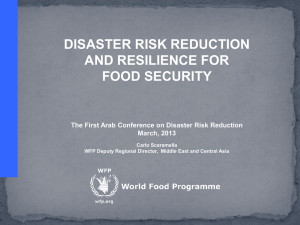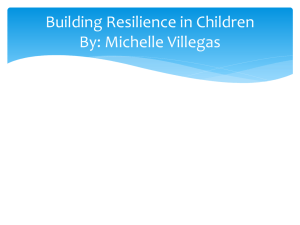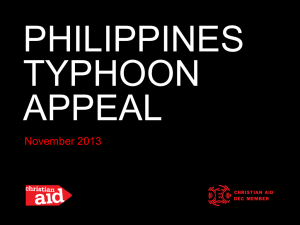Terms of Reference
advertisement
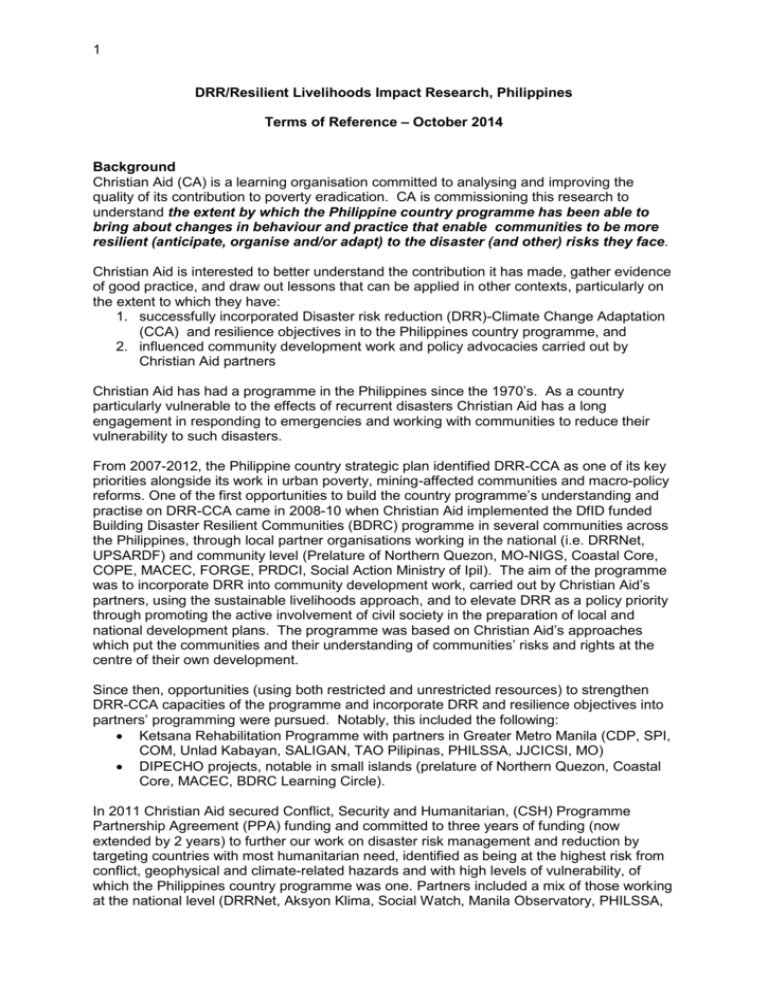
1 DRR/Resilient Livelihoods Impact Research, Philippines Terms of Reference – October 2014 Background Christian Aid (CA) is a learning organisation committed to analysing and improving the quality of its contribution to poverty eradication. CA is commissioning this research to understand the extent by which the Philippine country programme has been able to bring about changes in behaviour and practice that enable communities to be more resilient (anticipate, organise and/or adapt) to the disaster (and other) risks they face. Christian Aid is interested to better understand the contribution it has made, gather evidence of good practice, and draw out lessons that can be applied in other contexts, particularly on the extent to which they have: 1. successfully incorporated Disaster risk reduction (DRR)-Climate Change Adaptation (CCA) and resilience objectives in to the Philippines country programme, and 2. influenced community development work and policy advocacies carried out by Christian Aid partners Christian Aid has had a programme in the Philippines since the 1970’s. As a country particularly vulnerable to the effects of recurrent disasters Christian Aid has a long engagement in responding to emergencies and working with communities to reduce their vulnerability to such disasters. From 2007-2012, the Philippine country strategic plan identified DRR-CCA as one of its key priorities alongside its work in urban poverty, mining-affected communities and macro-policy reforms. One of the first opportunities to build the country programme’s understanding and practise on DRR-CCA came in 2008-10 when Christian Aid implemented the DfID funded Building Disaster Resilient Communities (BDRC) programme in several communities across the Philippines, through local partner organisations working in the national (i.e. DRRNet, UPSARDF) and community level (Prelature of Northern Quezon, MO-NIGS, Coastal Core, COPE, MACEC, FORGE, PRDCI, Social Action Ministry of Ipil). The aim of the programme was to incorporate DRR into community development work, carried out by Christian Aid’s partners, using the sustainable livelihoods approach, and to elevate DRR as a policy priority through promoting the active involvement of civil society in the preparation of local and national development plans. The programme was based on Christian Aid’s approaches which put the communities and their understanding of communities’ risks and rights at the centre of their own development. Since then, opportunities (using both restricted and unrestricted resources) to strengthen DRR-CCA capacities of the programme and incorporate DRR and resilience objectives into partners’ programming were pursued. Notably, this included the following: Ketsana Rehabilitation Programme with partners in Greater Metro Manila (CDP, SPI, COM, Unlad Kabayan, SALIGAN, TAO Pilipinas, PHILSSA, JJCICSI, MO) DIPECHO projects, notable in small islands (prelature of Northern Quezon, Coastal Core, MACEC, BDRC Learning Circle). In 2011 Christian Aid secured Conflict, Security and Humanitarian, (CSH) Programme Partnership Agreement (PPA) funding and committed to three years of funding (now extended by 2 years) to further our work on disaster risk management and reduction by targeting countries with most humanitarian need, identified as being at the highest risk from conflict, geophysical and climate-related hazards and with high levels of vulnerability, of which the Philippines country programme was one. Partners included a mix of those working at the national level (DRRNet, Aksyon Klima, Social Watch, Manila Observatory, PHILSSA, 2 ATM, RWAN) and community level (PHILNET, Coastal Core, FORGE, SPI, Minland, Unlad Kabayan). Currently, CA in the Philippines is applying the lessons learned and approaches used in its Yolanda Rehabilitation and Resilience Programme. Based on what we had learnt during our implementation of BDRC in 6 countries, the debate had moved forward and the programme was now focused on an integrated approach to Resilient Livelihoods, of which DRR is an important component. Christian Aid’s approach to Resilient Livelihoods can be found in Annex 1, and our expectations on DRR as a component of this in Annex 2. Purpose The overall purpose of this research is to establish the intended and unintended impact of Christian Aid’s DRR-CCA and resilience work on poor men and women over the past 7 years in the Philippines, including: Determining how strategies/ interventions of the Philippine programme, partners, and communities contributed to these impacts; Documenting good practices and lessons that can be shared with other programmes and stakeholders; and, Recommending ways and means to improve the resilience work of the Philippine country programme and Christian Aid’s global approach to resilience. Audience and how the document will be used This study is primarily for Christian Aid and partners. Information gathered in this research will also be used to provide evidence to donors on our commitment to DRR and resilience in our programmes. It will also contribute to sector-wide discussions on the value that introducing this resilience and partner-based approach has (or not) to projects/programmes. Evaluation Team Composition The evaluation team will be composed of: 1. Lead Consultant: primary responsibility for o leading, designing, implementing, and report writing of the study o coordinating and collaborating with the CA steering group 2. National Consultant: responsible for supporting the Lead Consultant, particularly bringing an understanding of the national context and approaches to DRR/resilience within the Philippines, and coordinate with a country programme assistant on logistics for data collection, should it be necessary 3. A Christian Aid staff not associated with this programme: responsible for informing evaluation team with Christian Aid’s overall approach to partnership and resilience programming. It is highly desirable that the CA staff will be able to use the output of the study and the learnings in the evaluation process to his/her current post and programme. The evaluation team will work with the following CA staff (the steering group) for the duration of the project: Senior Programme Officer, Resilience – Janaki Kuhanendran Senior Programme Officer, Philippines – Allan Vera Senior Programme Officer, Philippines - Jojo Matriano Programme Advisor, Resilience - Simone Di Vicenz Senior Humanitarian Performance Advisor – Juliet Parker Proposed Activities 3 1. Study and team preparations 2. Review of sector wide approaches to measuring impact in DRR/resilience programmes 3. Collaboration with the CA steering group Orientation of resilience programme in CA Philippines Development of methodology, particularly in refining research questions, scoping and defining limitation of the study, determining research methods Methodology should deliver convincing empirical data (both qualitative and quantitative) of the impact (or not) of CA’s DRR/resilient livelihoods approach and programming in the Philippines Sample selection of communities will need to be identified during discussions around methodology. The Philippines resilience programme is broad and varied, and the intention of this research is not to analyse and represent all areas of the programme but to identify a number of specific areas where we can drill down and make a more thorough analyse of our impact. Sample communities may therefore be selected to represent different areas of programming (rural/urban), geographical areas, levels of investment, areas that have faced disasters during/since the period of implementation etc. Logistical arrangements Updating of progress and adjustments 4. Review of Secondary data Project evaluation reports (primarily focused on the impact of DRR projects on communities) (i.e., BDRC final evaluation; Ketsana rehabilitation programme evaluation; Dipecho funded projects – BDRSIP, ASCEND, SUBU; CA’s Climate change review; PPA mid-term review 2012) Project Publications (Documentation/ case studies of Projects) (i.e., Building Disaster-Resilient Communities: Stories and lessons from the Philippines; A Voyage to Disaster Resilience in Small Islands: A Guide for Local Leaders; Resilient Urban Communities: Stories from Ketsana Rehabilitation Programme) and unpublished case studies CA Philippine CPSP 2012-2016 and 2007-2012 and associated reviews Annual Philippine Programme reports Programming documents / Proposals (e.g., Ketsana Rehabilitation Programme, Yolanda Rehabilitation and Resilience Programme, etc.) (optional - to provide background on different projects and evidence of DRR/Resilience integration into Country programming) Christian Aid briefing papers on Resilient Livelihoods and Value for Money Selected Project reports (e.g., BDRC, Ketsana, DIPECHO funded projects) 5. Data gathering, including Initial interviews with key CA/partner staff as required and field data gathering 6. Preliminary Report Write-up 4 7. Workshop with CA Philippine team and ICH-based staff and select partners Validation of findings, preliminary analysis and recommendations Feedback on methodology used and possible application in other contexts 8. Final Write-up and management response Considerations It is recognised that the Philippines DRR/resilient livelihoods programme was not set up with this impact study in mind, and that the quality of documentation of different programmes and projects will vary. The consultant may therefore need to develop creative ways to access data while ensuring as much rigour as is possible. CA is particularly interested to find ways in which the research can investigate the value for money, particularly in the context of DRR/resilience work wherein indicators are based on possibly-unrealized scenarios (e.g., Reduced disaster damage and loss). For Christian Aid’s interpretation of value for money please see Annex 4. CA is keen to emphasise the community perception of impact and would like, if possible, to examine the change in behaviour and practice in their experience of recurrent emergencies. CA is interested in determining impact at a community level, but understanding the contribution of our programme and partnership approach to this. We are interested in receiving recommendations on the development of sound impact indicators for resilience and how this could be practically incorporated in ongoing programmes. We recognise that that the benefits of our resilience work at a programme and partnership level may not yet have filtered down as tangible impact at a community level. We are interested in a methodology that can help us to understand the potential impact of such interventions which can take some years to come to fruition. We are exploring the possibilities for commissioning a broader research piece early in the next financial year which would build on findings from this study across a wider range of our interventions in the Philippines to more fully understand the breadth and depth of our contribution to resilience at local to national levels. We hope this TOR can lay some of the foundations for this follow on piece of research. Timeline (Exact dates to be finalised) Activity Study and team preparations Review of sector wide approaches to measuring impact in DRR/resilience programmes Collaboration with the CA steering group Review of Secondary data Data Gathering Preliminary Report Write-up Validation and Feedback Workshop Final Write-up Nov Dec Jan Feb Mar 5 Research management A representative from the steering group will be responsible for the overall management of this piece of research and for ensuring its purpose is fulfilled. Members of the steering group in both the Philippines and London will be jointly responsible for recruiting the consultant(s) and for the appropriate management of this process. A representative from the steering group will provide the consultant/s with all the Christian Aid documentation on previous and present DRR/Resilience work The steering group will work with the Evaluation Team to develop the methodology to reflect Christian Aid’s evolving approach to building resilient livelihoods and communities. CA London and the Philippines will be responsible for all arrangements relating to the field research Profile of the consultants Significant field experience in humanitarian or development programming (both would be a plus) Excellent knowledge of written and spoken English Significant experience in designing and testing research methodologies using both quantitative and qualitative techniques (lead consultant in particular) Understanding and knowledge of the Philippines context and the development of DRR/resilient livelihoods practices in the region (national consultant in particular) An understanding of evaluative practices relating to advocacy work at local to national levels would be desirable Good knowledge and practice of participatory research methodologies Good communications skills Ability to manage the available time and resources and to work to tight deadlines Ability to write clear reports (will be required to produce examples of previous work) Expression of Interest invited by Friday 7th November 2014 We are looking to recruit for both positions of lead and national consultants. Applications are invited for either post from suitably qualified consultants. Those interested in the lead consultant position should submit: A brief methodology and structure of how the research will be conducted over the evaluation period; as well as how the final report will be structured A description of how the consultant plans to spend the budget, splitting costs and time by research phase (planning, desk review, interviews, management, research and report writing). Total number of days planned and daily rate should be clearly outlined CV(s) and covering letter explaining how you meet the above profile References of similar work conducted by the consultant Those interested in the national consultant position should submit: CV(s) and covering letter explaining how you meet the above profile References of similar work conducted by the consultant


